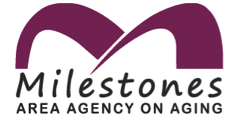February 9, 2023
Heart Health: Life’s Essential 8
 By Mike Mathews
By Mike Mathews
Milestones Area Agency on Aging
Of the many health concerns for older adults, heart health is one that can never be underemphasized. People age 65 and older are much more likely than younger people to suffer a heart attack, to have a stroke, or to develop coronary heart
disease (commonly called heart disease) and heart failure. Heart disease is also a major cause of disability, limiting the activity and eroding the quality of life of millions of older people.
Aging can cause changes in the heart and blood vessels. For example, as you get older, your heart can’t beat as fast during physical activity or times of stress as it did when you were younger. However, the number of heartbeats per minute (heart rate) at rest does not change significantly with normal aging.
Changes that happen with age may increase a person’s risk of heart disease. A major cause of heart disease is the buildup of fatty deposits in the walls of arteries over many years. The good news is there are things you can do to delay, lower, or possibly avoid or reverse your risk.
Recently, the American Heart Association updated their “Essential 8,” the key measures for improving and maintaining cardiovascular health. The list below represents the American Heart Association’s recommendation to lower the risk for heart disease, stroke and other major health problems.
1. Eat Better
Aim for an overall healthy eating pattern that includes whole foods, lots of fruits and vegetables, lean protein, nuts, seeds, and cooking in non-tropical oils such as olive and canola.
2. Be More Active
Adults should get 2 ½ hours of moderate or 75 minutes of vigorous physical activity per week. Kids should have 60 minutes every day, including play and structured activities.
3. Quit Tobacco
Use of inhaled nicotine delivery products, which includes traditional cigarettes, e-cigarettes and vaping, is the leading cause of preventable death in the U.S., including about a third of all deaths from heart disease. And about a third of U.S. children ages 3-11 are exposed to secondhand smoke or vaping.
4. Get Healthy Sleep
Most adults need 7-9 hours of sleep each night. Children require more: 10-16 hours for ages 5 and younger, including naps; 9-12 hours for ages 6-12; and 8-10 hours for ages 13-18. Adequate sleep promotes healing, improves brain function and reduces the risk for chronic diseases.
5. Manage Weight
Achieving and maintaining a healthy weight has many benefits. Body mass index, a numerical value of your weight in relation to your height, is a useful gauge. Optimal BMI is 25. You can calculate it online or consult a health care professional.
6. Control Cholesterol
High levels of non-HDL, or “bad,” cholesterol can lead to heart disease. Your health care professional can consider non-HDL cholesterol as the preferred number to monitor, rather than total cholesterol, because it can be measured without fasting beforehand and is reliably calculated among all people.
7. Manage Blood Sugar
Most of the food we eat is turned into glucose (or blood sugar) that our bodies use as energy. Over time, high levels of blood sugar can damage your heart, kidneys, eyes and nerves. As part of testing, monitoring hemoglobin A1c can better reflect long-term control in people with diabetes or prediabetes.
8. Manage Blood Pressure
Keeping your blood pressure within acceptable ranges can keep you healthier longer. Levels less than 120/80 mm Hg are optimal. High blood pressure is defined as 130-139 mm Hg systolic pressure (the top number in a reading) or 80-89 mm Hg diastolic pressure (bottom number).
Milestones Iowa Area Agency on Aging promotes healthy lifestyles for older adults through education, counseling, and a variety of fitness and wellness classes to help keep you healthy and independent. Learn more at https://www.milestonesaaa.org/wellness-programs/.
Filed Under: Community, Health & Wellness
Trackback URL: https://www.50pluslife.com/2023/02/09/heart-health-lifes-essential-8/trackback/


